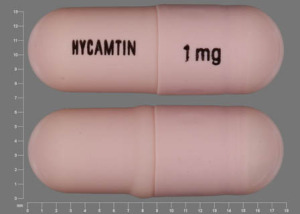Hycamtin Dosage
Generic name: TOPOTECAN HYDROCHLORIDE 4mg in 4mL
Dosage form: injection, powder, lyophilized, for solution
Drug class: Miscellaneous antineoplastics
Medically reviewed by Drugs.com. Last updated on Jun 27, 2025.
Important Safety Information
Verify dosage using body surface area. Do not exceed a single dose of 4 mg intravenously.
Recommended Dosage for Ovarian Cancer
The recommended dosage of HYCAMTIN for injection is 1.5 mg/m2 by intravenous infusion over 30 minutes daily for 5 consecutive days, starting on Day 1 of a 21-day cycle until disease progression or unacceptable toxicity.
Recommended Dosage for Small Cell Lung Cancer (SCLC)
The recommended dosage of HYCAMTIN for injection is 1.5 mg/m2 by intravenous infusion over 30 minutes daily for 5 consecutive days, starting on Day 1 of a 21-day cycle.
Recommended Dosage for Cervical Cancer
The recommended dosage of HYCAMTIN for injection is 0.75 mg/m2 by intravenous infusion over 30 minutes daily on Days 1, 2, and 3, in combination with cisplatin 50 mg/m2 on Day 1, of a 21-day cycle.
Dosage Modifications for Adverse Reactions
Hematologic
Do not administer subsequent cycles of HYCAMTIN for injection until neutrophils recover to greater than 1,000/mm3, platelets recover to greater than 100,000/mm3, and hemoglobin levels recover to greater than or equal to 9 g/dL (with transfusion if necessary).
For HYCAMTIN for injection as a single agent, reduce the dose to 1.25 mg/m2/day for:
- neutrophil counts of less than 500/mm3 or administer granulocyte-colony stimulating factor (G-CSF) starting no sooner than 24 hours following the last dose
- platelet counts less than 25,000/mm3 during previous cycle
For HYCAMTIN for injection in combination with cisplatin, reduce the dose to 0.6 mg/m2/day (and further to 0.45 mg/m2 if necessary) for:
- febrile neutropenia (defined as neutrophil counts less than 1,000/mm3 with temperature of greater than or equal to 38.0°C (100.4°F) or administer G-CSF starting no sooner than 24 hours following the last dose
- platelet counts less than 25,000/mm3 during previous cycle
Dosage Modification for Renal Impairment
For HYCAMTIN for injection as a single agent, reduce the dose to 0.75 mg/m2/day for patients with creatinine clearance (CLcr) of 20 to 39 mL/min (calculated with the Cockcroft-Gault method using ideal body weight).
Preparation and Intravenous Administration
- Visually inspect for particulate matter and discoloration prior to administration, whenever solution and container permit.
Preparation
- Reconstitute each 4 mg vial of HYCAMTIN for injection with 4 mL Sterile Water for Injection, USP.
- Dilute the appropriate volume of the reconstituted solution in either 0.9% Sodium Chloride Intravenous Infusion, USP or 5% Dextrose in Water Injection, USP.
Stability
- Because the vials contain no preservative, use contents immediately after reconstitution. Discard any unused portion.
- Store reconstituted product diluted for infusion at approximately 20°C to 25°C (68°F to 77°F) protected from light for no more than 24 hours. Discard after 24 hours.
HYCAMTIN for injection is a cytotoxic drug. Follow applicable handling and disposal procedures.1
More about Hycamtin (topotecan)
- Check interactions
- Compare alternatives
- Pricing & coupons
- Drug images
- Latest FDA alerts (1)
- Side effects
- During pregnancy
- Generic availability
- Drug class: miscellaneous antineoplastics
- Breastfeeding
- En español
Patient resources
- Hycamtin oral/injection drug information
- Hycamtin (Topotecan Intravenous) (Advanced Reading)
- Hycamtin (Topotecan Oral) (Advanced Reading)
Professional resources
Related treatment guides
See also:
Further information
Always consult your healthcare provider to ensure the information displayed on this page applies to your personal circumstances.


